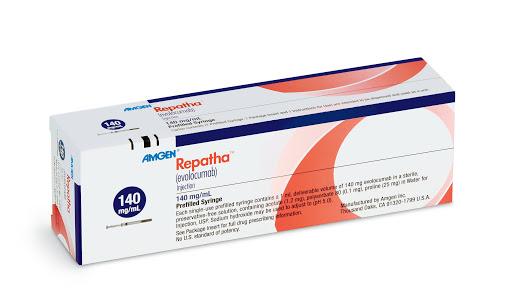Evolocumab Side Effects
Applies to evolocumab: subcutaneous solution.
Precautions
It is very important that your doctor check your progress at regular visits. This will allow your doctor to see if the medicine is working properly to lower your cholesterol level and to decide if you should continue to use it. Blood tests may be needed to check for unwanted effects.
Serious allergic reactions, including angioedema may occur while you are using this medicine. Tell your doctor right away if you have a rash, itching skin, difficulty with breathing or swallowing, hives, large, hive-like swelling on the face, eyelids, lips, tongue, throat, hands, legs, feet, or sex organs, nausea, reddening of the skin, especially around the ears, swelling of the eyes, face, or inside of the nose, or unusual tiredness or weakness.
The needle cover of the prefilled syringe or autoinjector contains dry natural rubber (a derivative of latex), which may cause allergic reactions in people who are sensitive to latex. The single use Pushtronex® system is not made with natural rubber latex. Tell your doctor if you have a latex allergy before you start using this medicine.
Common side effects of evolocumab
Some side effects of evolocumab may occur that usually do not need medical attention. These side effects may go away during treatment as your body adjusts to the medicine. Also, your health care professional may be able to tell you about ways to prevent or reduce some of these side effects.
Check with your health care professional if any of the following side effects continue or are bothersome or if you have any questions about them:
More common side effects
- back pain
- bleeding, blistering, burning, coldness, discoloration of the skin, feeling of pressure, hives, infection, inflammation, itching, lumps, numbness, pain, rash, redness, scarring, soreness, stinging, swelling, tenderness, tingling, ulceration, or warmth at the injection site
- blurred vision
- body aches or pain
- chills
- cough
- dry mouth
- ear congestion
- flushed, dry skin
- fruit-like breath odor
- general feeling of discomfort or illness
- headache
- loss of voice
- muscle aches
- sneezing
- sore throat
- stomach ache
- stuffy or runny nose
- sweating
- trouble breathing
- unexplained weight loss
- vomiting
Less common side effects
- bladder pain
- bloody or cloudy urine
- diarrhea
- difficult, burning, or painful urination
- difficulty with moving
- dizziness
- frequent urge to urinate
- loss of appetite
- lower back or side pain
- muscle or joint pain
- muscle stiffness
- nervousness
- pain or tenderness around the eyes and cheekbones
- pounding in the ears
- slow or fast heartbeat
- swollen joints
Serious side effects of evolocumab
Along with its needed effects, evolocumab may cause some unwanted effects. Although not all of these side effects may occur, if they do occur they may need medical attention.
Check with your doctor immediately if any of the following side effects occur while taking evolocumab:
Incidence not known
- difficulty with breathing or swallowing
- fever
- hives, itching, or rash
- large, hive-like swelling on the face, eyelids, lips, tongue, throat, hands, legs, feet, or genitals
- nausea
- reddening of the skin, especially around the ears
- swelling of the eyes, face, or inside of the nose
- unusual tiredness or weakness
See also:
For healthcare professionals
Applies to evolocumab: subcutaneous solution.
General adverse events
The more commonly reported adverse reactions have included nasopharyngitis, upper respiratory tract infection, back pain, and injection site reactions.
Hypersensitivity
- Common (1% to 10%): Hypersensitivity reactions (including rash, eczema, erythema, urticaria)
- Postmarketing reports: Angioedema[Ref]
Cardiovascular
- Common (1% to 10%): Hypertension[Ref]
Gastrointestinal
- Common (1% to 10%): Diarrhea, gastroenteritis, nausea (1.8%)[Ref]
Genitourinary
- Common (1% to 10%): Urinary tract infection[Ref]
Local
- Common (1% to 10%): Injection site reaction (including erythema, pain, bruising)[Ref]
Musculoskeletal
Nervous system
- Common (1% to 10%): Headache, dizziness
- Uncommon (0.1% to 1%): Neurocognitive events (0.2%)[Ref]
Other
Respiratory
- Common (1% to 10%): Influenza, fatigue (1.6%)
- Uncommon (0.1% to 1%): Contusion[Ref]
Immunologic
- Rare (less than 0.1%): Development anti-drug antibody
- Postmarketing reports: Influenza-like illness[Ref]
References
1. (2015) "Product Information. Repatha (evolocumab)." Amgen USA
Frequently asked questions
- Praluent vs Repatha: What's the difference?
- What is the difference between Leqvio and Repatha?
- Does Repatha cause weight gain or loss?
- Can you drink alcohol and take Repatha?
- How long should you take Repatha?
- Is Repatha effective without a statin?
- How long do Repatha side effects last?
More about evolocumab
- Check interactions
- Compare alternatives
- Reviews (760)
- Dosage information
- During pregnancy
- Drug class: PCSK9 inhibitors
- Breastfeeding
Patient resources
Other brands
Professional resources
Other brands
Related treatment guides
Further information
Evolocumab side effects can vary depending on the individual. Always consult your healthcare provider to ensure the information displayed on this page applies to your personal circumstances.
Note: Medication side effects may be underreported. If you are experiencing side effects that are not listed, submit a report to the FDA by following this guide.

